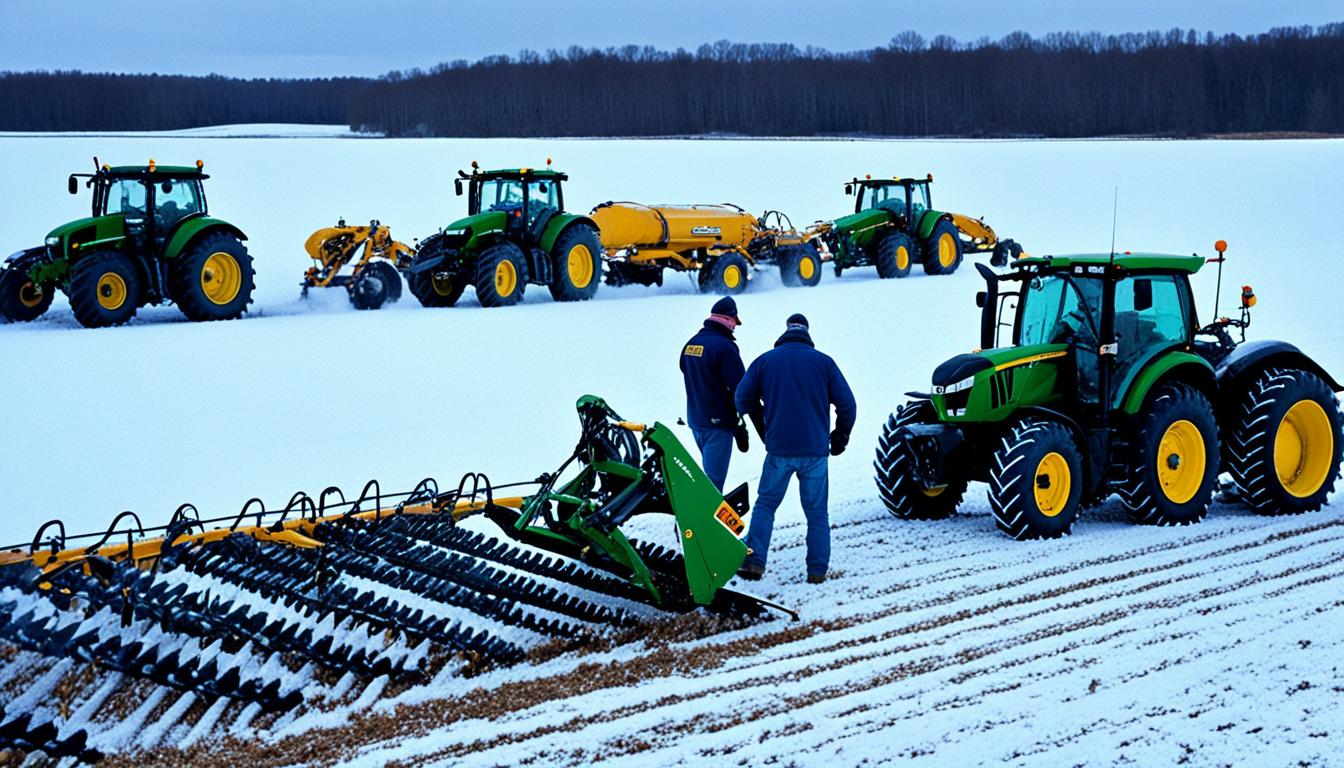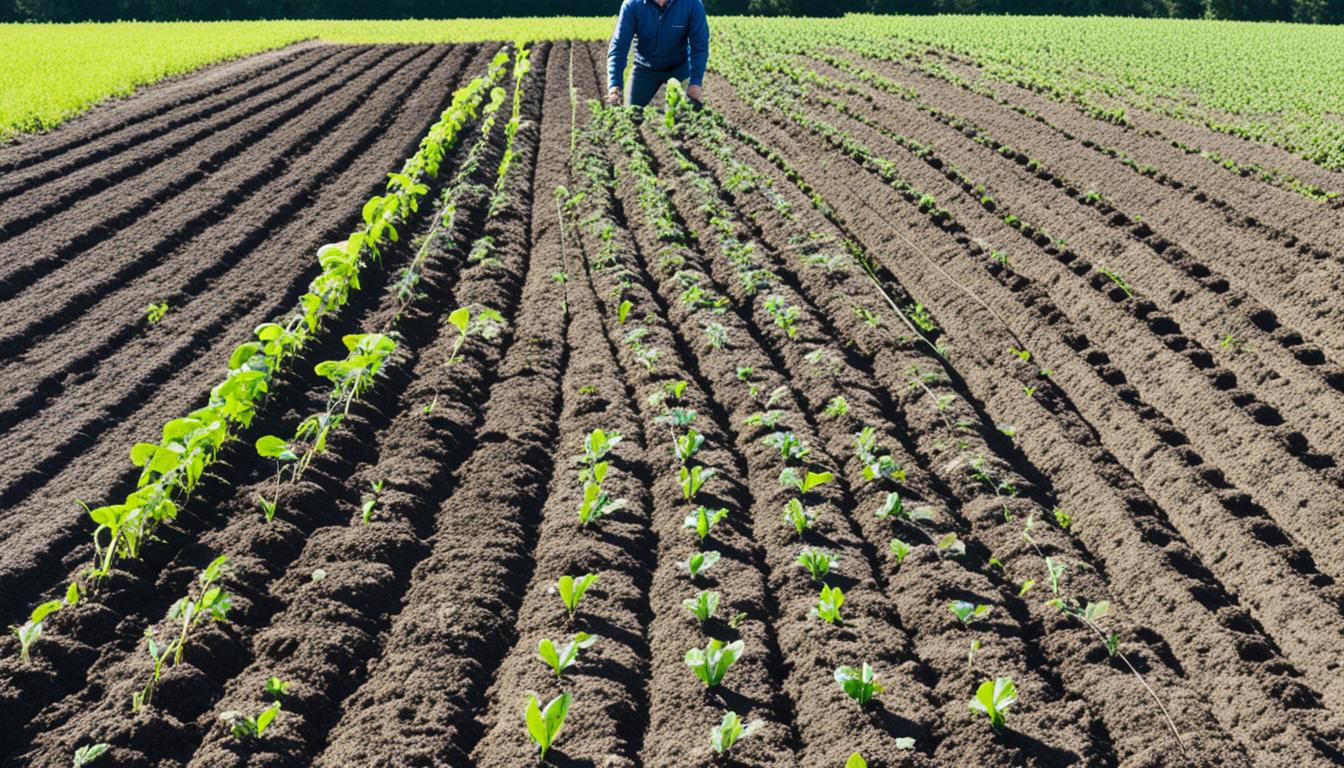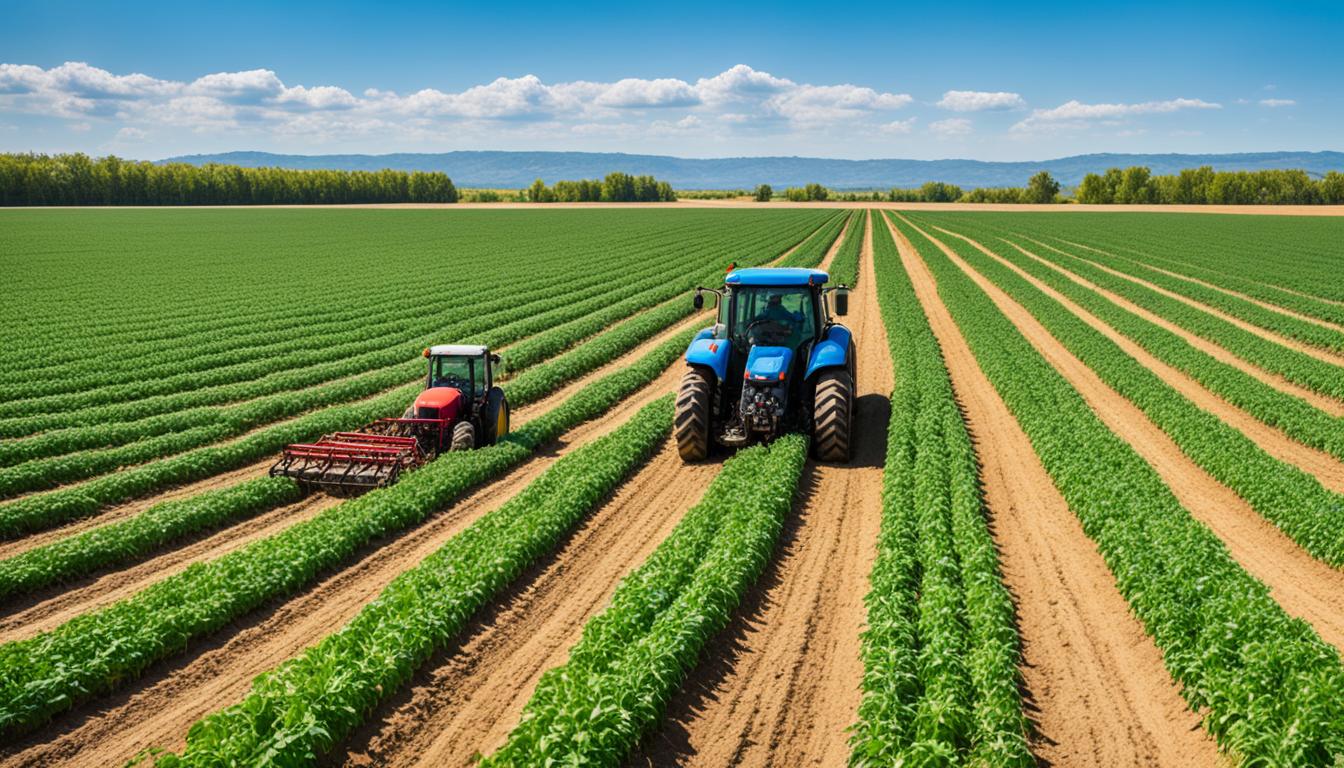Winter is a key time for crop farmers to get ready for the growing season. Even though the fields are quiet, there’s a lot to do to keep the farm in top shape. You’ll be busy with planning, fixing equipment, and more.
This article will show you the many things farmers do in winter to make the next year successful. You’ll learn about planning for crops, fixing up the farm, and managing money. It’s all about getting ready for the busy season ahead.
Working on your greenhouse, taking care of cover crops, or connecting with other farmers in your area is important. These winter tasks help set you up for a great growing season. By focusing on these key activities, you’ll be ready for whatever comes next and can enjoy a successful farm.
Introduction to Winter Farm Life
When the growing season ends, crop farmers start on important tasks for the next year. This period, known as the “off-season,” is crucial for farm preparation. It’s a time to get ready for the next cycle of growth.
The Importance of Off-Season Farm Management
Good off-season management is vital for your crops to do well the next year. In winter, focus on maintenance, planning, and preparation. These tasks will help set the stage for a great harvest. By doing these tasks now, you increase your chances of a successful growing season.
Setting the Stage for a Productive Year
The off-season is ideal for reviewing your farm’s performance and making strategic plans. Look at crop yields and soil health, and plan for equipment and infrastructure upgrades. The work you do now will help make the next year productive and successful.
| Task | Importance |
|---|---|
| Crop Planning and Preparation | Selecting the right crop varieties and ordering seeds ensures a successful growing season. |
| Equipment Maintenance | Keeping your farm machinery in top condition prevents costly breakdowns and downtime. |
| Farm Infrastructure Upgrades | Investing in barn, shed, and fence repairs/improvements optimizes your farm’s efficiency. |
Embrace the winter months to set your farm up for success. Focus on your off-season tasks, and you’ll be ready for a great growing season.
Winter Crop Planning and Preparation
As winter comes, smart farmers in the U.S. start planning for the next growing season. This off-season work is crucial for a good harvest. It makes sure their crops will do well in the coming months.
Selecting Crop Varieties and Ordering Seeds
Choosing the right crops is a big part of winter work. Climate, soil, and market demand are key factors. By picking the best crops, you can increase your yields and serve your local community better.
After picking the best crops, it’s time to order seeds. This needs careful planning to have enough supplies for spring. Ordering early helps you get the seeds you want and avoid delays.
Soil Analysis and Nutrient Management
Winter is also the best time to check your soil. Knowing your soil’s condition and nutrient levels helps you plan better. This way, you can feed your crops right and help them grow strong.
By focusing on these winter tasks, you set yourself up for a great growing season. Your hard work and planning will show when you plant and see your crops grow.
Farm Equipment Maintenance and Repair
As a crop farmer, keeping your farm equipment in good shape is key during winter. It’s crucial for your machines to work well when you start growing again. Here are steps to keep your farm equipment running well.
Routine Maintenance Checklist
- Thoroughly clean and inspect all farm equipment, including tractors, harvesters, and implements.
- Change engine oil and filters as recommended by the manufacturer.
- Grease all moving parts and check for any wear or damage.
- Test batteries and replace them if necessary.
- Sharpen blades and replace any worn-out parts.
- Ensure all safety features are functioning properly.
Identifying and Addressing Repairs
Use the off-season to check your farm equipment for any issues. Fixing problems early can prevent breakdowns later. This saves you time and trouble.
| Equipment | Common Repair Issues | DIY or Professional? |
|---|---|---|
| Tractors | Engine problems, transmission issues, hydraulic leaks | Depends on the complexity; some repairs may require a professional |
| Harvesters | Worn-out bearings, broken belts, failed sensors | Typically require a professional for major repairs |
| Implements | Bent or broken parts, worn-out attachments | Some basic repairs can be done DIY, but complex issues may need a professional |
Keep your farm equipment in top shape during winter. This way, it’ll be ready for the growing season. Being proactive saves you time, money, and trouble later.
Winter Farm Infrastructure Projects
When winter comes, crop farmers can focus on important projects around their farms. This time lets them fix and better their barns and sheds. They can also keep and put up new fences for the next growing season.
Barn and Shed Repairs and Improvements
Keeping your farm’s barns and sheds in good shape is key. In winter, check these buildings for damage or wear. Then, fix any issues, like leaky roofs or worn-out siding, and add better insulation for energy savings.
You can also improve your barns and sheds. Add new storage, change the layout, or put in better lighting and ventilation. These changes make your farm infrastructure work better and more efficiently.
Fence Maintenance and Installation
Fences are crucial for keeping animals safe and crops safe. Winter is a great time to look over your fences for damage or weak spots. Fix broken posts, tighten wires, and replace old parts to keep your fences strong.
Installing new fences in winter is also a good idea. The ground is easier to work with, and you can get the new fence up before planting starts. Whether you’re using stronger materials or making your farm bigger, winter is the best time for fence maintenance and installation projects.
| Farm Infrastructure Projects | Benefits |
|---|---|
| Barn and Shed Repairs | Improved structural integrity, enhanced energy efficiency, and increased functionality. |
| Fence Maintenance and Installation | Secure livestock, protect crops, and delineate farm boundaries. |
By focusing on these farm infrastructure projects in winter, you make sure your farm is ready for the growing season. The effort you put in now will help a lot later.
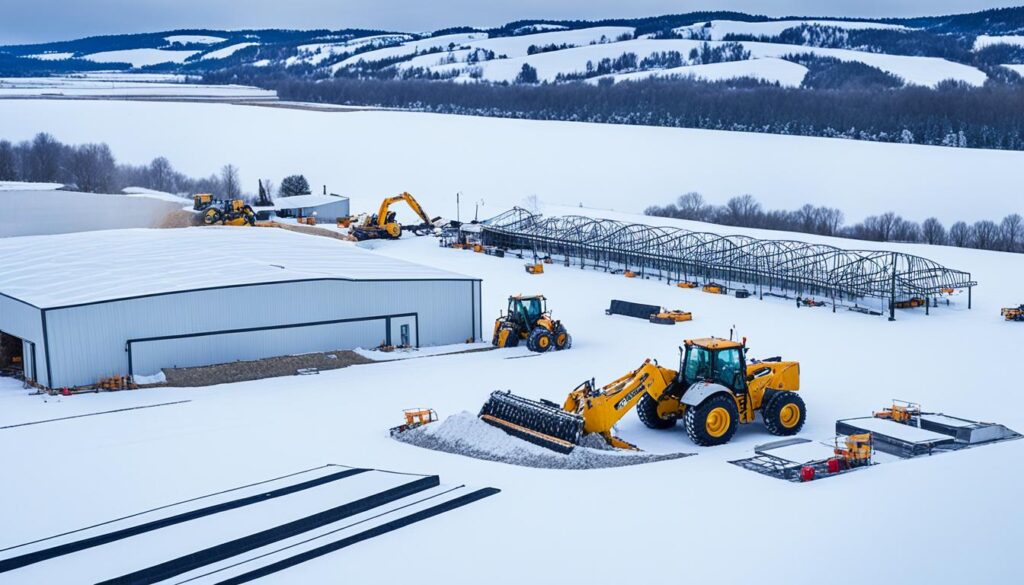
Farm Record Keeping and Financial Management
Keeping accurate records and managing finances well is key for a farm’s long-term success. In winter, smart farmers track their farm expenses and farm income. This helps them get ready for tax season and keeps their farm financially healthy.
Tracking Expenses and Income
It’s vital to keep detailed records of your farm’s expenses and income. This includes everything from seed and fertilizer costs to equipment and crop sales. Keeping track of every financial move helps you stay organized and understand your farm’s financial health.
Preparing for Tax Season
Winter is the best time for farmers to start preparing for tax season. By going through their records and sorting out expenses and income, farmers can make tax filing easier. This early work helps avoid problems and makes the most of deductions and credits, reducing taxes.
Having a solid financial record-keeping system is crucial for farm success. By tracking expenses, keeping an eye on income, and preparing for taxes in winter, farmers lay a strong foundation for a successful year.
“Effective record-keeping is the key to unlocking the true financial potential of your crop farm.” – [Expert Farmer]
Employee Management and Training
Crop farmers know how important a skilled and dedicated team is. In the off-season, they work on managing their employees, offering training, and getting their team ready for the growing season.
Managing employees well is key to a farm’s success. Crop farmers spend time checking how their team is doing, finding areas to improve, and making plans to boost skills and productivity. By creating a positive work place and thanking their employees, farmers can keep a loyal and motivated team.
Training is a big part of managing employees on crop farms. In the off-season, farmers set up training programs to give their team the knowledge and skills they need for crop production. These training sessions cover everything from using farm equipment to farming in a way that’s good for the planet.
| Training Program | Focus Areas | Delivery Method |
|---|---|---|
| Equipment Operation |
|
|
| Pest and Disease Management |
|
|
| Sustainable Farming Practices |
|
|
By focusing on employee management and training, crop farmers can create a team that’s skilled and motivated. This team is ready to face the challenges of the growing season and help the farm succeed.
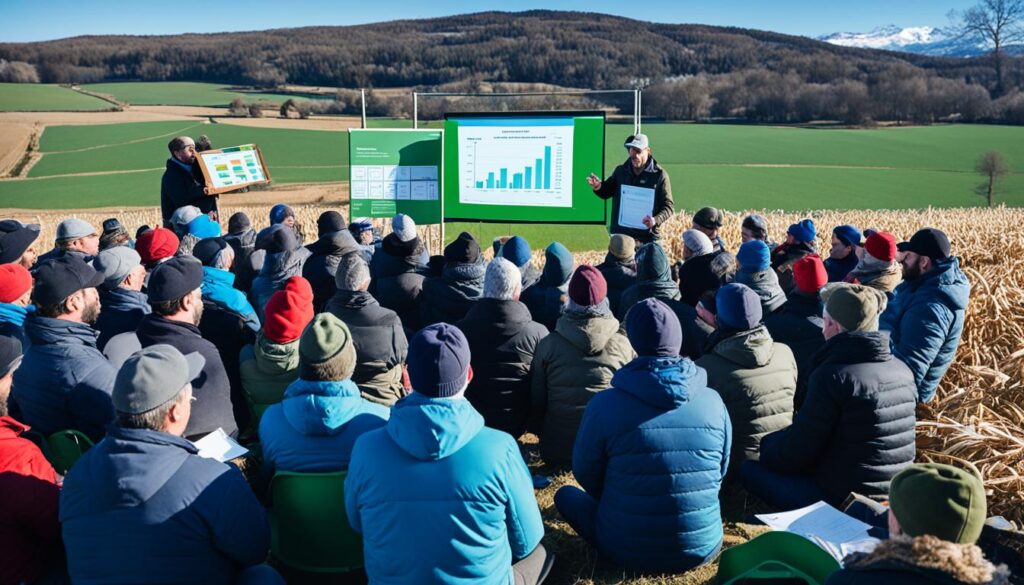
“A well-trained and engaged workforce is the backbone of a thriving crop farm. We make it a priority to ensure our team has the knowledge and skills they need to excel.”
– Farmer Jane Doe, XYZ Farms
Winter Crop Activities
Even when the main growing season is slow, crop farmers stay busy with important winter tasks. They work on greenhouse operations, plant propagation, and cover crop management. These activities are key to getting ready for the next year.
Greenhouse Operations and Propagation
When the fields are covered in snow, the action moves to the greenhouse. Farmers use this place to start new plants, like seedlings and cuttings, for the next season. This helps them start growing early and have a strong supply of healthy plants.
In the winter, farmers keep an eye on the greenhouse’s temperature, humidity, and light. They make sure these conditions are perfect for plants to grow. They also clean and disinfect the greenhouse to stop pests and diseases.
Cover Crop Management
- Cover crops are grown in the off-season to protect and improve the soil.
- During winter, farmers manage these crops by mowing, tilling, or ending them at the right times.
- This keeps the soil healthy, stops weeds, and adds organic matter to the fields for the next season.
“Cover crops are the unsung heroes of sustainable agriculture. They work hard under the surface to keep our soils healthy and ready, even when the fields are asleep.”
By doing these winter tasks, farmers get their farms ready for a great growing season. They focus on greenhouse management, starting new plants, and taking care of cover crops. This makes sure their fields are ready to grow well when spring comes.
What Do Crop Farmers Do in the Winter
When the growing season ends, crop farmers start on important tasks for the winter. These tasks are key to the success and productivity of their farms. They make sure their farms are ready for the next year.
One main job for farmers in winter is planning for the next year. They pick the best crops, order seeds, and test the soil. This planning helps them start strong when spring comes.
Farmers also spend a lot of time keeping their equipment and buildings in good shape. They fix tractors, barns, and fences to make sure everything is ready for spring.
Keeping track of money and records is another big part of winter work. Farmers track their spending and income. They also get ready for tax time to keep their farms financially healthy.
Winter is also a time for learning and helping the community. Farmers go to conferences and events to stay updated and network. This helps them grow personally and support agriculture as a whole.
Winter is key for farmers to prepare for a great year. They plan, maintain, and learn to make sure their farms do well.
| Winter Farm Activities | Description |
|---|---|
| Crop Planning and Preparation | Selecting crop varieties, ordering seeds, and conducting soil analysis |
| Equipment Maintenance and Repair | Servicing tractors, implements, and other farm machinery |
| Infrastructure Projects | Repairing and improving barns, sheds, and fences |
| Financial Management | Tracking expenses, income, and preparing for tax season |
| Professional Development | Attending conferences, workshops, and community events |
“The winter months are a critical time for crop farmers to lay the groundwork for a successful growing season. It’s during this off-season that we focus on planning, maintenance, and continuous improvement to ensure our farms remain productive and profitable.”
Winter Farm Safety and Precautions
As winter comes, crop farmers must focus on safety and handle harsh weather well. Keeping equipment and facilities in good shape is key to keeping workers, assets, and operations safe during this important time.
Dealing with Harsh Weather Conditions
Winter storms and extreme cold can be dangerous for farmers. To stay safe, you should:
- Make sure all workers have the right gear for cold weather and warm places to stay.
- Have a detailed plan for emergencies like power cuts, broken equipment, and other surprises.
- Keep up with the weather forecast and change your work plans if needed.
Maintaining Equipment and Facilities
Keeping farm equipment and buildings in good shape is crucial in winter. Regular checks and fixing things quickly can stop expensive problems and keep your farm running smoothly. Make sure to:
- Get your farm vehicles, machines, and tools ready for winter by draining fluids, checking tires, and fixing any mechanical issues.
- Look over and fix barns, sheds, and other buildings to stop any damage, leaks, or insulation problems.
- Keep roads, paths, and busy areas clear to make sure everyone can move safely around the farm.
By focusing on winter farm safety and being proactive, you can keep your workers safe, protect your valuable equipment and buildings, and get ready for a successful growing season.
Farm Outreach and Community Involvement
As crop farmers, you are key to your local community. In the winter, when your fields rest, you can connect with your community and the wider farming world. Going to agricultural conferences and workshops, and joining local events and groups, helps your farm and community.
Attending Agricultural Conferences and Workshops
Winter is a great time for farmers to learn and network. At agricultural conferences and workshops, you can discover new farming methods, tech, and trends. These events offer expert talks, panel discussions, and demos that boost your farming skills and yields.
Being there lets you meet other crop farmers and agricultural pros. You can share stories, swap tips, and make connections that could lead to new partnerships or mentorships.
Participating in Local Events and Organizations
Winter is also a good time for farmers to join local groups. Being part of local events and organizations helps your community and highlights the value of farming and your role as a crop farmer.
- Volunteer at events like farmer’s markets, food banks, or youth programs.
- Join the board of agricultural organizations or community groups.
- Host tours or workshops at your farm to teach people about your farming ways.
- Help with local government projects on agriculture, land use, or the environment.
By engaging with your community, you strengthen bonds, share your knowledge, and show how crucial crop farmers are. They support local food systems and economies.

“Connecting with our community is not just a responsibility, but an opportunity to share our passion for farming and make a real difference.”
Conclusion
As winter ends, crop farmers can be proud of their hard work. They’ve planned, maintained equipment, and engaged with their communities. These efforts set the stage for a successful year.
Choosing the right crops, improving soil health, and managing finances will help as spring arrives. Training your team and ensuring safety means your farm can handle whatever weather comes. This preparation will keep your farm running well.
Winter has given you a chance to grow and make your farm sustainable. Now, as you move into the next part of the farming cycle, think about what you’ve achieved. Look forward to the good things coming in the next seasons.
